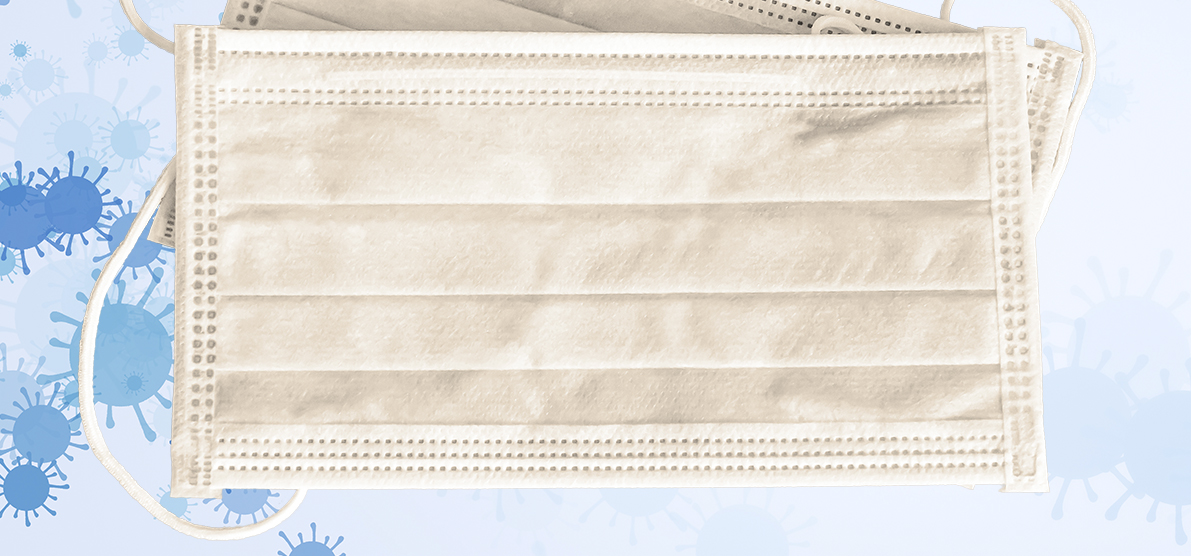
Pivoting during the pandemic
Care during COVID-19 requires compassion and creative thinking
By Kimberly Catley
When the COVID-19 pandemic hit the U.S., a flood of critically ill patients quickly followed. Faced with hospitals that were understaffed, underequipped and overwhelmed, VCU College of Health Professions graduates headed straight for the front lines, while others volunteered to leave home and work in hard-hit areas. Meanwhile, chaplains and patient counselors searched for innovative ways to foster human connection and healing in a socially distant world.
Here are the stories of just a few faculty, students and alumni who, when faced with the biggest challenges of their professional lives, went above and beyond the call of duty.
‘A human necessity to be in a community’
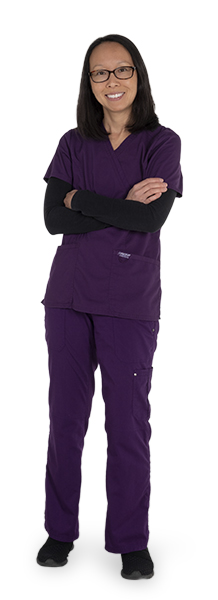
For the NICU team, the death of any baby is heartbreaking. But when one baby girl died suddenly — after her family spent months in the VCU NICU — both parents and staff struggled with the sudden break in the relationship, and the distance forced by COVID-19.
That’s when Allison DeLaney, pediatric and women’s health chaplain in the VCU Department of Patient Counseling, got an idea for a makeshift memorial procession in front of the family’s home. DeLaney also created a ritual, where one person placed a vase on the sidewalk, the next filled it with water, and each subsequent visitor added a flower until they created a full bouquet. A chaplain resident played the guitar throughout, softening the atmosphere. The result was a powerful, shared experience that helped the family and the hospital staff process their grief together.
“You can’t begin to grieve until you acknowledge the death actually happened,” DeLaney says. “This ritual was a human necessity to be in a community, to acknowledge and mourn.”
DeLaney and others in the Department of Patient Counseling are learning to think creatively when navigating COVID-19 restrictions.
FaceTime is a common tool for connecting patients with family members on the outside — or down the hall. DeLaney worked with one mother who was bed-bound following an accident. She didn’t remember delivering her baby, who was in the NICU. The two couldn’t visit, but photos weren’t enough to foster mother-infant bonding. Through video chat, the mother could talk to her baby, see him respond and ask questions of the nursing staff.
‘It’s exceptionally challenging, but we’re also innovating...’
Leigh Mackintosh
“It helped ease her mind that she could be involved and understand what was happening,” DeLaney says. “And then just pure delight; all those baby firsts, she got to experience in real time.”
In another case, Leigh Mackintosh, a chaplain resident, helped a 19-year-old get the support of her family as she made end-of-life decisions for her mother. The mother had terminal cancer and ended up in the COVID-restricted area of the emergency department where only one visitor was allowed and cellphone reception was limited. Mackintosh worked with the care team to allow the daughter to speak with family members and, eventually, for her stepfather and siblings to join her.
“Once she was able to connect with family, she felt a lot more supported,” Mackintosh says. “They were able to make a decision that her mom could move to comfort care.”
Mackintosh adds that everyone has an expectation of what they need when saying their final goodbyes, but COVID-19 disrupts those hopes and desires.
“It’s exceptionally challenging,” she says, “but we’re also innovating, creating new ways of getting around these challenges or meeting people in the midst of them. When we come out on the other side of this, we’re going to have better ways of helping people than we did before.”
'We have to be their voice'
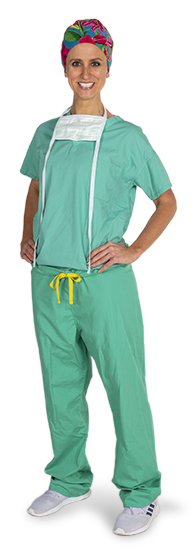
Fellow nurse anesthetist graduates Katherine Hopper (CRNA ’15/’16/NA) and Tenaja Lynch (CRNA ’08/NA) felt equally called to work on the front lines of the pandemic. Both volunteered to step away from St. Mary’s Hospital in Richmond to manage COVID-19 ICUs at Saint Barnabas Medical Center in Livingston, New Jersey. The hospital was just 30 minutes from New York City and had the second-highest number of cases in the state.
"I remember getting an email from our anesthesia group asking for help," Hopper says. "I knew I couldn't sit back and watch. As a nurse anethestist, I have a unique set of skills, and I wanted to go up there and do what I was trained to do."
“I remember getting an email from our anesthesia group asking for help. I knew I couldn’t sit back and watch. As a nurse anesthetist, I have a unique set of skills, and I wanted to go up there and do what I was trained to do.”
Hopper helped manage one of the overflow ICUs. She coordinated a team of doctors, nurses, respiratory therapists and infectious disease experts to provide critical care management of five to eight patients on ventilators.
Hopper says she honed her team-oriented mindset while studying at VCU, but her comprehensive approach to patient care was equally critical. COVID-19 patients need someone who studies every detail, from ventilators, blood pressure and vasoactive medications to fluid management and electrolyte imbalances.
“We are the No. 1 advocate for the patient,” Hopper says. “That applies both in my anesthesia daily life and in the management of these critically ill patients. They’re sedated and paralyzed and in a medically induced coma, so we have to be their voice.”
Rituals of meaning
Hindu funeral practices require swift action — a person’s body must be cremated within 24 hours of their death. But when a patient’s COVID-19 status is uncertain, certain protocols are needed to protect family members, health care workers and funeral home staff.
That was the situation chaplain resident Leigh Mackintosh faced when supporting a Hindu family during end-of-life care. Through careful coordination, she was able to create space for the family to be at the patient’s bedside and ensure the burial rituals were conducted in time.
“Holding that tension was hard, because I know both sides,” Mackintosh says. “I’m aware of the dangers. I also know how being with loved ones in these final moments and doing these rituals of meaning allows you to engage more fully with the grief process.”
Celebratory rituals are just as important for encouraging human connection during a crisis. Patient Counseling staff worked to reimagine several holiday celebrations, such as a digital iftar organized by chaplain resident William Williamson, in partnership with M. Imad Damaj, Ph.D., from the Department of Pharmacology and Toxicology. Iftar is the meal eaten by Muslims after sunset during Ramadan.
“The Muslim community faced a heart-wrenching question: ‘How do we celebrate our holiest month — a month based on community meals — during COVID-19?’” Williamson says. “If we could not break our fast in the same room, at least we could be in the same Zoom meeting.”
Real-life training
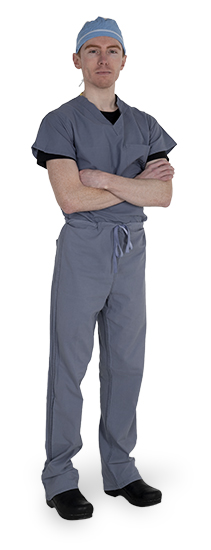
Patrick Brown (CRNA ’20). Student, VCU Department of Nurse Anesthesia. Provided critical care nursing for COVID-19 patients at VCU Medical Center ICU
When VCU moved classes online and clinical hours were cut back, five students in the nurse anesthesia program signed up to treat COVID-19 patients in the VCU Medical Center ICU.
Katherine Loftus (NA-2), Rachel Barksdale (NA-2), Patrick Brown (NA-3), Patty Joyce (NA-2) and Hope Mancini (NA-2) were not yet permitted to perform anesthesia procedures, but they were trained and experienced in critical care nursing.
“A lot of us were like: It would be great, it would be awesome to go back and help any way we can,” Barksdale said in an interview with Richmond’s CBS Channel 6. “Some of these patients are very sick, and when they go downhill, they go downhill pretty quickly.”
Treating patients was also an opportunity to continue their training, even as some instruction had been scaled back.
“We have to focus on the clinical education of our students in health care, period,” Suzanne Wright, Ph.D., chair of VCU’s nurse anesthesia program, said to CBS 6. “Because they are the future people who will be handling the next pandemic.”
‘If they don’t have you, who do they have?’
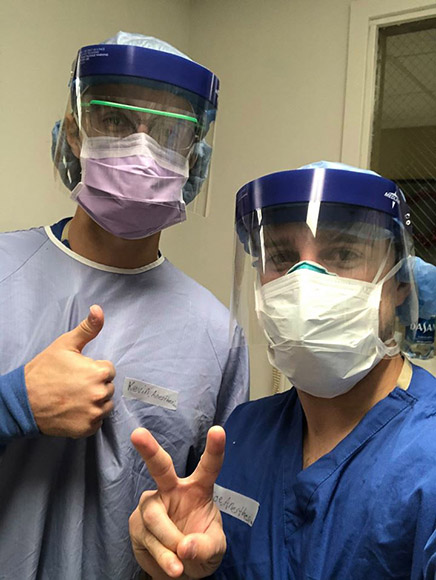
Joe Biscardi (CRNA ’19/NA) was just six weeks into his first job after graduating from VCU’s Doctor of Nurse Anesthesia Practice program when everything changed.
Biscardi had been hired to provide anesthesia services to surgical patients at New York’s Mercy Medical Center, located about 40 minutes from Manhattan. In late March, he started noticing an uptick in elective surgery cancellations. On a Friday, he got a call from his manager.
“The ICUs were starting to fill up,” he says. “By Saturday night, there were six patients to one nurse. The patients were total care; they were sedated, ventilated. They couldn’t do anything for themselves. We [the nurse anesthetists] were asked to come in and support the nurses in any way possible.”
A week later, the hospital had created three makeshift intensive care units to accommodate the surge in patients. In addition to supporting the ICU nurses, Biscardi was called to intubate patients throughout the hospital — sometimes more than 10 in a 12-hour shift. The hospital also had a shortage of personal protective equipment, beds and health care workers.
At the same time, Biscardi watched as members of his childhood community died, often separated from their families.
“I had to accept death,” he says. “We didn’t know back then how deadly it was. All we were seeing was people getting super sick. Some were dying almost immediately; some were making it a few weeks on a ventilator."
“This is what we’re called to do. You don’t realize that it might get to the level of a pandemic, but the community needs you. If they don’t have you, who do they have?”
Joe Biscardi
After a few days, Biscardi posted on Facebook to describe the environment and encourage people to stay home. His former roommate and good friend Kevin Pyne (CRNA ’19/NA) immediately reached out with an offer to help.
Pyne was only two weeks into his new job with Inova Fairfax Hospital in Northern Virginia, which also was canceling elective surgeries. His supervisor supported his request to spend a month at Mercy and, three days later, Pyne was in New York. “Mercy brought nurses from all other departments within the hospital, anyone who was willing to go to the ICU,” Pyne says. “It was very moving to be part of that kind of collective effort.”